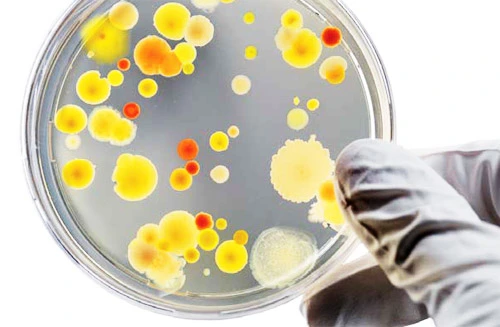Tiny useful little things: The fight for brightening up the image of microscopic life forms
Strings of slime snake through the lemonade. When opened it gives off a cheesy smell. The culprit is Leuconostoc, a lactic acid bacterium that metabolises highly concentrated sugar and forms slime. A whole cargo of the new soft drink is ruined. Goods spoiled by microorganisms cause German companies huge economic losses. Nevertheless, Birgit Fiedler is no fan of sweeping condemnation of microorganisms like yeasts, fungi or bacteria.
Twelve years ago Birgit Fiedler, a doctor of food engineering, founded the special laboratory for applied microbiology in Adlershof. This accredited microbiology testing laboratory analyses medicinal products, pharmaceutical products, drinking water, cosmetics and foodstuffs; advises industry; and hosts training courses. In May the company put a new clean room laboratory into operation.
The knowledge of microorganisms has multiplied over the last twenty years. In the meantime, new technologies have even allowed insights into whole new worlds of life, including microorganisms: So called extremophiles live in environments utterly hostile to life, e.g. in the deep sea, under high pressure, or in hot springs. Their metabolites could, for example, gain in importance as additives for the food of the future.
Yet with all this knowledge, the damage has not become less. “We make the same mistakes time and time again,” explained Birgit Fiedler. “We try to outwit biology with chemistry and physics, and it’s not working.” Even with something as simple as drinking water, the very first concerns always address lead, zinc or pesticides. “But the greatest threat for drinking water is bacterial poisoning, like cholera.” Germany has a “chemical mindset”, she summed up.
As early as 1990 Fiedler published articles about her “tiny useful little things” and the “attack of the invisible ones”, subjects she still fights for today, championing enlightenment and brightening up the image of these microscopic life forms. When they are in their proper environment, Fiedler explained, fungi, yeasts and bacteria do a useful job. Who wants to imagine beer or bread without yeast? How would yoghurt, cottage cheese or sauerkraut taste without lactic acid bacteria? And who wants gorgonzola without the veining? When, though, lactic acid bacteria gain access to beer, they have a completely different effect: The beer sours.
“In industrial food production, poor hygiene is the most common cause of spoiling by microorganisms,” said Birgit Fiedler. The precise examination of the production processes is often adequate enough for the first “diagnosis”. “We did everything as always” is one of the arguments that Birgit Fiedler gets to hears most of all. Yet there are always minor discrepancies.
In the soft drink mentioned above, the bacteria gained access via the sugar that came from a new supplier. They originally arrived with the source material, the sugar beet or the sugar cane, and were simply dragged through the whole processing chain where they fed on the sugar and digested it into an evil smelling goo.
Von Rico Bigelmann
Link: www.speziallabor.com
